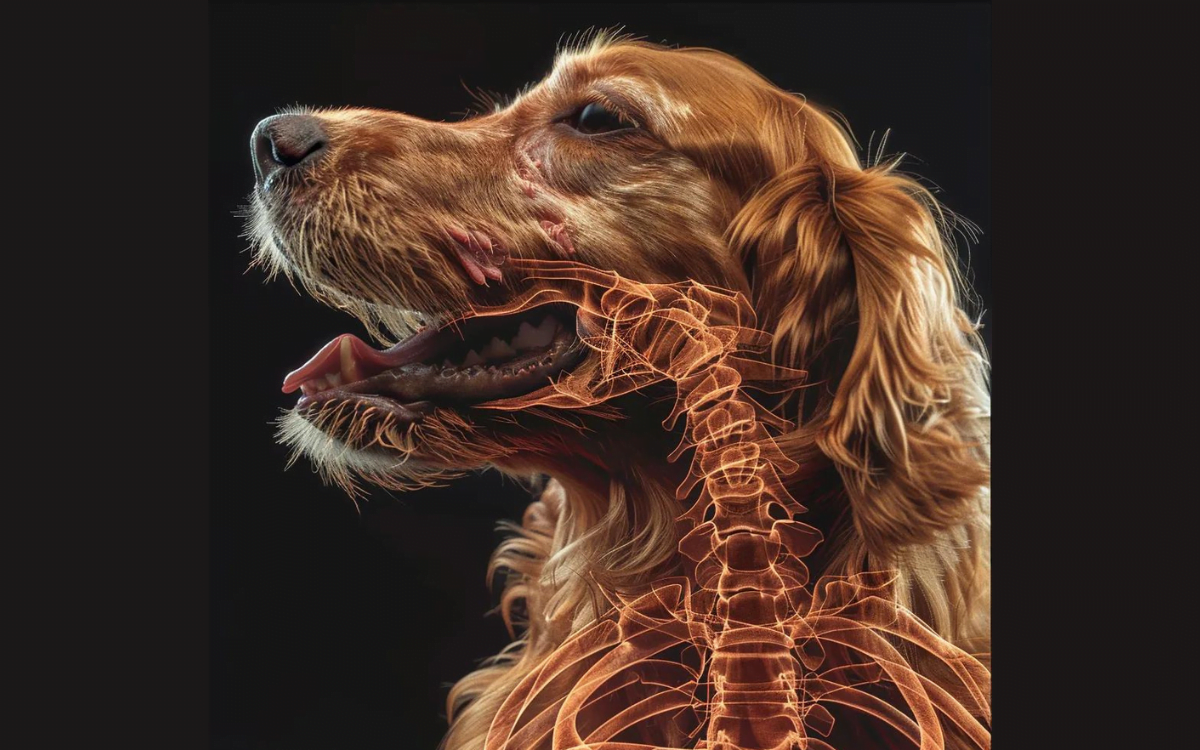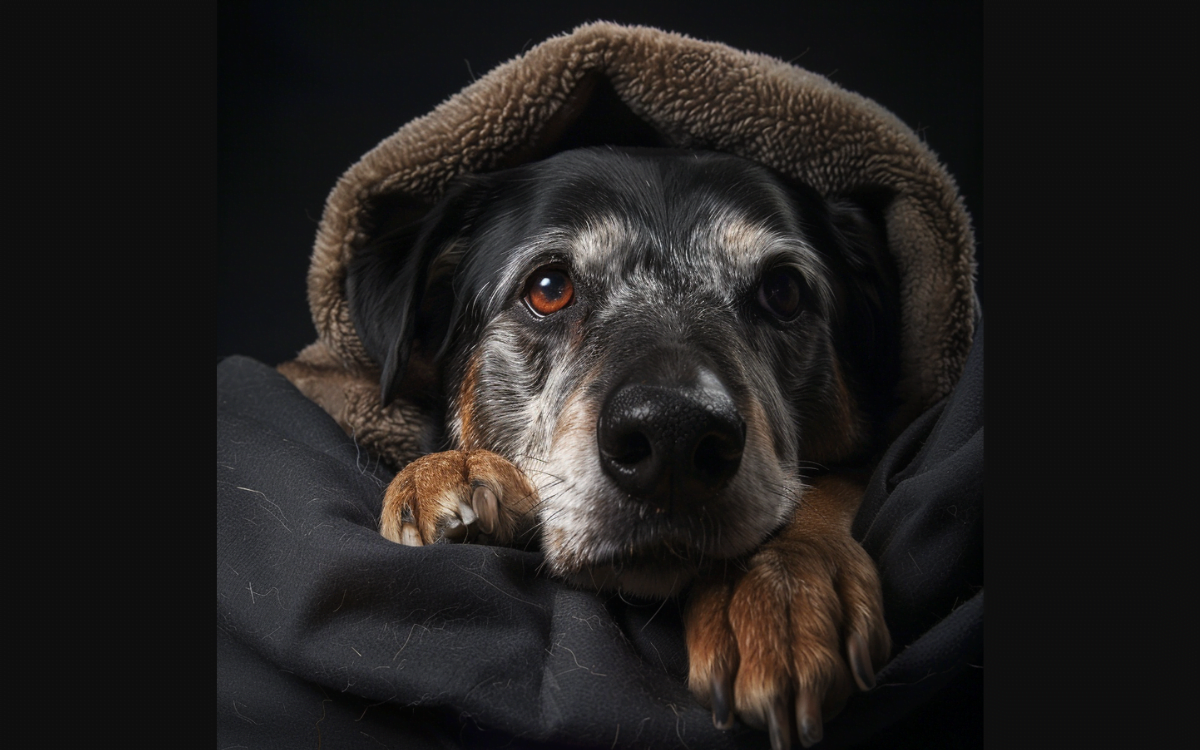Have you ever noticed your dog hacking away like they’re trying to cough up a hairball, especially after playtime or excitement? It might be more than just a tickle in their throat.
What is a collapsed trachea?
Tracheal collapse is a condition in dogs where the cartilage rings in the windpipe weaken and collapse, causing difficulty breathing. The most common sign is a harsh, dry cough that sounds like a goose honking. Small and toy dog breeds are most at risk.

Imagine your dog’s windpipe, or trachea, as a flexible tube held open by C-shaped rings of cartilage. These rings act like scaffolding, keeping the airway open for air to flow freely to the lungs. In a condition called tracheal collapse, these cartilage rings weaken and lose their rigidity. This causes the trachea to narrow or even collapse, making it difficult for your furry friend to breathe.
Signs of a collapsed trachea
The telltale sign of a collapsed trachea is a harsh, dry cough that often sounds like a goose honking. This cough typically worsens with exercise, excitement, pulling on the leash, or when picking your dog up. Other signs include labored breathing, rapid breathing, wheezing, and even fainting in severe cases.
Breeds most commonly affected
Small and toy dog breeds like Yorkshire Terriers, Pomeranians, Poodles, Chihuahuas, and Shih Tzus are more prone to developing tracheal collapse. This is likely due to their smaller trachea size and weaker cartilage.
Causes of Tracheal Collapse
While the exact cause of tracheal collapse isn’t entirely clear, veterinarians suspect a combination of factors might be at play. Here, we’ll delve into some of the most common culprits behind this respiratory condition:
Genetics
There’s a strong genetic link to tracheal collapse, especially in certain breeds. Breeds like Yorkshire Terriers, Poodles, and Pomeranians seem to be predisposed due to an inherited weakness in their tracheal cartilage. If your dog belongs to a breed known for this condition, it’s crucial to be aware of the signs and symptoms.
Age-Related Changes

As our furry companions age, their bodies naturally undergo changes. The cartilage in the trachea can weaken and lose elasticity over time, making them more susceptible to collapse. While age is a contributing factor, it’s not a guarantee. Early diagnosis and preventive measures can significantly improve your senior dog’s quality of life.
Chronic Cough and Inflammation
Did you know that a persistent cough can actually contribute to tracheal collapse? Constant irritation and inflammation in the airways can weaken the cartilage rings over time. This highlights the importance of addressing any chronic coughing your dog might have to prevent further complications.
Other Medical Conditions
Certain medical conditions can put additional stress on the trachea, increasing the risk of collapse. These include:
- Obesity: Excess weight puts pressure on the chest cavity, including the trachea.
- Heart disease: An enlarged heart can press on the trachea, narrowing the airway.
- Respiratory infections: Inflammation from infections can weaken the trachea and make it more prone to collapse.
- Exposure to irritants: Smoke, dust, and other airborne irritants can inflame the airways and contribute to weakening of the cartilage.
The exact cause of tracheal collapse is unknown, but it’s likely a combination of factors like genetics, age, chronic cough, and other medical conditions such as obesity, heart disease, respiratory infections, and exposure to irritants.
Treatment of Tracheal Collapse
The good news is that tracheal collapse can be managed, and in some cases, even improved, with the right treatment approach. Here, we’ll explore the different avenues veterinarians might take to help your dog breathe easier:
Medication
Medications can play a crucial role in managing the symptoms of tracheal collapse and improving your dog’s comfort. Here are some common medications used:
- Cough suppressants: These medications help to reduce the frequency and intensity of coughing, which can irritate the airways and worsen the collapse.
- Anti-inflammatory drugs: Medications like corticosteroids can help to reduce inflammation in the airways, making breathing easier.
- Bronchodilators: These medications relax the muscles around the airways, allowing for easier passage of air.
- Sedatives: In some cases, calming medications may be prescribed to help manage anxiety or excitement, which can exacerbate coughing.
It’s important to note that all medications should be administered under the guidance of a veterinarian.

Lifestyle Modifications
Making adjustments to your dog’s daily routine can significantly benefit their respiratory health. Here are some key lifestyle changes to consider:
- Weight management: Maintaining a healthy weight reduces pressure on the chest cavity and trachea.
- Harness instead of a collar: Using a harness instead of a collar minimizes pressure on the trachea during walks and playtime.
- Environmental control: Minimize exposure to smoke, dust, and other airborne irritants that can irritate the airways.
- Consider using an air purifier if necessary.
- Stress management: Stress and anxiety can worsen coughing. Techniques like crate training and providing a calm environment can help reduce stress.
Surgery
In severe cases where other treatments haven’t been effective, surgery might be an option. Surgical procedures aim to stabilize the trachea and prevent further collapse. There are different surgical techniques available, and the best approach will depend on your dog’s individual case. It’s crucial to discuss the risks and benefits of surgery thoroughly with your veterinarian.
Conclusion
While a diagnosis of tracheal collapse can be concerning, it’s important to remember that many dogs with this condition can live happy and fulfilling lives with proper management. Early detection and intervention are key to achieving the best outcome for your furry friend.

Here are some key takeaways:
- Early diagnosis is essential: The sooner tracheal collapse is diagnosed, the sooner treatment can begin and the better your dog’s quality of life will be.
- Veterinary care is crucial: Regular checkups with your veterinarian are essential for monitoring your dog’s condition and adjusting treatment as needed.
- Management is key: Lifestyle modifications and medications can significantly improve your dog’s breathing comfort and overall well-being.
With love, care, and the right veterinary guidance, your dog with tracheal collapse can continue to enjoy an active and happy life by your side.
FAQs
Can a dog with tracheal collapse still enjoy playtime?
Yes, dogs with tracheal collapse can still enjoy playtime, but with some adjustments! Here are some tips:
- Keep playtime calm and controlled: Avoid roughhousing or activities that get your dog too excited, which can worsen coughing.
- Shorter, more frequent play sessions: Break up playtime into shorter bursts to prevent overexertion.
- Use a harness instead of a collar: This will minimize pressure on the trachea during play.
- Consider calmer activities: Sniffing games, mental stimulation toys, and gentle walks can be great alternatives to strenuous exercise.
What are some alternative methods for managing tracheal collapse besides medication?
While medication plays a crucial role in managing symptoms, there are alternative methods you can explore alongside veterinary recommendations:
- Weight management: Maintaining a healthy weight reduces pressure on the chest cavity and trachea.
- Herbal supplements: Certain herbs like licorice root and elecampane have anti-inflammatory properties that may help soothe airways (consult your veterinarian before using any supplements).
- Acupuncture: This traditional Chinese medicine practice may help manage coughing and improve respiratory function (consult a licensed veterinary acupuncturist).
- Air purification: Using an air purifier can help reduce exposure to dust, allergens, and other irritants that can trigger coughing.
Is tracheal collapse contagious to other dogs?
No, tracheal collapse is not contagious to other dogs. It’s a condition caused by weakened cartilage in the trachea, not by an infectious agent.
How can I modify my home environment to make it easier for my brachycephalic dog (like a Pug or Bulldog) to breathe if they have tracheal collapse?
Brachycephalic dogs with tracheal collapse can benefit from some environmental adjustments:
- Maintain a cool temperature: Heat and humidity can worsen breathing difficulties. Consider air conditioning or fans during hot weather.
Use a humidifier: Adding moisture to the air can help loosen mucus and ease congestion. - Reduce clutter: Declutter your home to create more space for your dog to navigate comfortably, especially during coughing episodes.
- Elevated food and water bowls: Elevating food and water bowls can improve posture and make breathing easier.
Are there any preventative measures I can take to reduce the risk of tracheal collapse in my dog?
While there’s no guaranteed way to prevent tracheal collapse, some measures can help reduce the risk:
- Maintain a healthy weight: Excess weight puts extra strain on the trachea.
- Avoid pulling on the leash: Use a harness to minimize pressure on the trachea during walks.
- Control chronic cough: Address any chronic coughing issues promptly to prevent weakening of the trachea.
- Air quality control: Minimize exposure to smoke, dust, and other airborne irritants.
Remember, these are general recommendations. It’s important to consult your veterinarian for a personalized plan to manage your dog’s tracheal collapse.

Healthy dogs mean happy dogs, and that makes me happy! I’m here to share all the tips for keeping your best furry friend in top shape, from puppyhood to their golden years.

